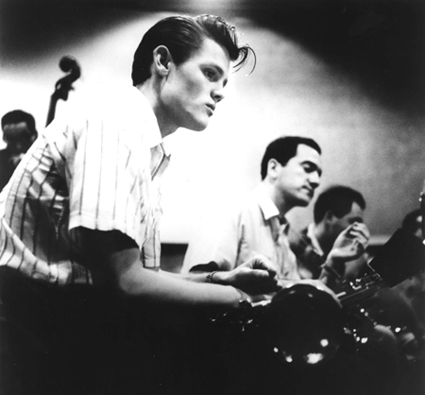|
Reviews of Recent Independent, Foreign, & Documentary Films in Theaters and DVD/Home Video
Directed & Produced by: Bruce Weber. Director of Photography: Jeff Preiss. Edited by: Angelo Corrao. Music by: Chet Baker. Released by: Little Bear Films. Country of Origin: USA. 119 min. Not Rated. Black & White. Director Bruce Weber has restored his 1989 Oscar-nominated documentary homage to Chet Baker for its first 35mm release in over 14 years, but its visual beauty and bemused insights into 1950’s popular culture are almost overwhelmed by affectations that come perilously close to making this a model for a Christopher Guest mockumentary, like a jazz progenitor of A Mighty Wind. Similar to a jazz riff, the film wanders around at first, both geographically and chronologically, before settling onto the theme of mythmaking. Baker recalls first hearing his jazz heroes while in the army, then performing with saxophonists Charlie Parker and Gerry Mulligan in Los Angeles. The film includes a marvelous compilation of archival performance footage, such as from The Steve Allen Show. Oddly, that is about the only discussion of his music, and almost no performances are seen or heard in their entirety without a voice-over. His smooth trumpet first thrilled audiences and fellow musicians before his intimate vocalizing placed him at the top of Down Beat polls, but drugs and denture problems almost destroyed his embouchure. By the end of the film, he speaks with more enthusiasm about how to make the best speed ball than the jazz legends he accompanied. Completed just months before his mysterious death from a fall out of an Amsterdam window, the film reinforces how he kept contributing to his mythology right up to the end as interviewers Weber and singer Cherry Vanilla get elusive responses from him as he maintains his established image. There is also amusingly contradictory information from those who worshipped him both close up and from afar – fans, colleagues, and his Oklahoma family. Particularly competitive is his harem of ex-wives and self-aggrandizing lovers who sound a lot like older versions of the groupie Penny Lane in Almost Famous. Their theme could be “Blame It on My Youth,” one of a dozen classic and contemporary songs Baker recorded specially for the soundtrack. Almost subsuming the man and his music, the film strongly explores the development and impact of his myth (an archetype for jazz musicians in general), though it skirts perceptions of him as the Great White Hope of jazz. Photographer William Claxton relates how he happened to catch Baker just at the cusp of his career in the 1950’s and how those pictures became iconic. With repeated comparisons to James Dean, Baker is presented as the basis for Robert Wagner’s character in 1960’s All the Fine Young Cannibals, seen in a clip entrancing Natalie Wood. During his European sojourn, Baker played on that image in Italian movies. But much of the film feels like a defensive response to D.A. Pennebaker’s Dont Look Back, which helped create Bob Dylan’s hip image in 1967. In looking back to what a slightly earlier generation of teenagers idolized, interviewees enthusiastically relate when they first heard which Baker album or heard him perform and pointedly dismiss the Beach Boys for overtaking the model of California music in the American imagination.
Pretentious footage meant to recreate how Baker epitomized youthful California cool is excruciatingly endless. Stand-ins for the younger Baker who
Weber thought were look-alikes, including Flea of the Red Hot Chili Peppers, frolic along Santa Monica beach with black-clad models imitating
freewheeling beatniks, interspersed with a windblown Baker in the back seat of a convertible between two women. Glimpses of rocker Chris Isaak
worshipfully looking at Baker in a recording studio strongly suggest that Herb Ritts’s famous 1991 music video for Isaac’s “Wicked Game” track was
inspired by this film. The celebrity pandering continues with extended footage of stars at the Cannes Film Festival. At least Baker himself – with
his craggy, ravaged visage – seems to take Weber’s efforts at nostalgia with a big grain of amused salt.
Nora Lee Mandel
|

